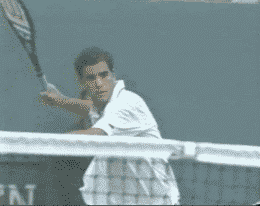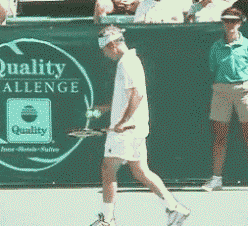<% ns_puts [mkm_getnavbar] %>

John McEnroe on the Mental Game
with John Yandell
Still Photos by J Gregory Swendsen
We all know the secret to winning the mental game is simple. Abuse every official in sight, and when things don't go your way, start screaming and throwing racquets. OK, Iím kidding. That might have worked for me sometimes, but it's probably not a good idea for the average player. Take it from me, it can end up causing all types of problems.
The real secret to being mentally tough is confidence. Great players win because they believe in themselves and believe they can come through in tough situations.
If you want to learn to win tough matches of your own, you should be looking for ways to increase your confidence. Basically, that means learning to stay positive about yourself, your game, and your chances in a given match.
|
All players have a mental breaking point. They can only take so much pressure before they crack and go negative. When that happens, they usually end up losing.
People lose sight of the fact that tennis is a game. Playing competitive tennis has to be fun if you want to be successful. If you consistently go negative on the court, you can end up burning yourself out and hating the game.
Have fun. Thatís easy to say. Stay positive under pressure. It's a little harder to do on the court, especially at critical points in a big match. You can also take that from me, personally.
|
There are a few things, though, that are key for tennis players at any level from the pros on down.
The first is to keep your eye on the ball.
Watch the ball! How many times have you heard that one? It may sound like
a clichť, but it's about as basic to playing tennis as you can get. Watch
the slow motion replays of the great players of the Grand Slams, and
you'll see they're all looking at the ball right when it's hit.
When players choke, they tend to take their eye off the ball at the last
second. A big part of hitting shots under pressure is just learning to
focus on the ball.
My idol Rod Laver once said: "There is no such thing as choking, only a lack of concentration." That's putting a positive spin on it. It also gives you a simple solution to think about it. Don't go negative. It's not that there's something wrong with you as a person. It's just you need to keep your concentration or maybe improve your ability to concentrate.
Even if you learn to watch the ball better, though, don't think that this or anything else can completely prevent choking.
|
Every player chokes in certain situations, whether itís the pros, junior tennis, or just a club match. So, don't think you're not going to choke. Think about how you're going to deal with it when it happens.
For me, if I choked, I didn't mind admitting it. The best thing was just to accept that it happened, try to learn from it, and not worry about it. If you get critical when you choke, it makes it harder to stay positive and confident about the match.
Another major factor in winning the mental game is learning how to pace your matches. Sometimes what you do between points is as important as anything else in a close match.
|
You need to use the time between points to keep control of yourself emotionally, to deal with the pressure, and to try to stay positive. It's a big mistake to rush your play in tight situations.
After you play a tough point, or before you start a big point, take your time. Let yourself recover and decide exactly what you want to do. Be as deliberate as you need to be. The player who controls the pace of the match, particularly on the big points is often the one who ends up winning these matches.
Watch the great players play. Youíll see how they tend to do the same things over and over between points. They make the other player play to their tempo. Itís a way of imposing your will on your opponent and it can be as important or more important than your shot making in winning the mental struggle.
Last Updated 5/1/02. To contact us, please email to: webmaster@tennisone.com
TennisONE is a registered trademark of TennisONE and SportsWeb ONE; Copyright 1995. All rights reserved.




